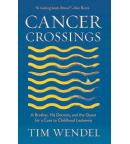BOOKMARK
Title: Cancer Crossings: A Brother, His Doctors, and the Quest for a Cure to Childhood Leukemia
Author: Tim Wendel
Publisher: ILR Press
Publication date: April 2018
Price: $24.95, hardcover, 256 pages

Tim Wendel is a journalist and author of several noted books, mostly concerning sports. In his new book, Cancer Crossings: A Brother, His Doctors, and the Quest for a Cure to Childhood Leukemia, he recounts his younger brother’s battle against leukemia and the pioneering doctors who worked to prolong his life. The doctors will be familiar names for readers of The ASCO Post—among them are Drs. James Holland, Lucius Sinks, and Donald Pinkel. In effect, this fine book combines dual pleasures for readers: it’s a heartfelt excavation of a painful stretch in the author’s life and a history of a seminal period in oncology.
Everything Was Fine Until…
The book begins a few days before Thanksgiving at the Wendel home in Olcott, New York, a lakeside community home to the deepest harbor on Lake Ontario. The Wendels are avid and adventurous sailors, and their boats have grown in size to accommodate the expanding family, which peaks with six kids. Everything is fine; they are a fun-loving, tight-knit bunch, which will draw the reader into a brand of family life that now seems corny in its appreciation of silly made-up games and a dad who races his kids up the stairs, with a resounding “Ibeecha!” from the proud winner.
Then everything for the Wendels changed. “At first, Eric Gordon Wendel appeared to be like the rest of us. He enjoyed being outside, in motion, always up to something…. So my parents were baffled when Eric could barely get out of bed late in the winter of 1966. He was 3 years old,” writes Mr. Wendel.
His brother had bruised his shin on a playdate in the Buffalo suburbs, and the blow had deepened and yellowed, lingering for weeks. Mrs. Wendel took him to the family pediatrician, who told her she was overreacting. But after several more visits, the doctor ordered blood tests and discovered that Eric had leukemia.
The parents rushed Eric to Lockport Memorial Hospital, where the family doctor was waiting, pacing back and forth. “‘I’m sorry,’ he repeatedly told my mother. ‘I failed you. I should have listened better,’” writes the author. Tough stuff, and it reminds one of the huge responsibilities physicians carry every day.
A Grim Confirmation
Another round of blood work confirmed a diagnosis of acute lymphoblastic leukemia, a grim prognosis in 1966. Eric was put on a study but soon developed a severe infection and had to withdraw. Throughout the narrative, Mr. Wendel gives the reader a clear account of his brother’s medical treatment and how his family rallied around the young boy, who showed such brave resilience that he won the hearts of all his providers.
Although the author slips in interesting sections dealing with ongoing family issues and some historical background about Eric’s doctors, the meat of the book takes place at Roswell Park Cancer Institute, as Dr. Holland and his colleagues try to keep Eric alive. In the book’s few pictures, Dr. Holland is captured sporting one of his trademark wide, flamboyant ties. In a moving passage, Dr. Holland tells Eric’s parents that there may be exceptions to the medical credo, “first do no harm,” noting that “if you treat everybody so nobody gets toxic [therapy], then you will have no effect on the tumor or the disease.”
Turning Back the Oncologic Pages of Time
Readers of The ASCO Post will enjoy the in-depth and personal history of Roswell Park, along with a bit of local politics. The author also adds an unexpected surprise, spending almost a full chapter on Dr. Holland’s wife, Jimmie Holland, MD, and her early efforts in psycho-oncology.
At the time Mr. Wendel’s brother was admitted to Roswell Park, James Holland had begun work on the hospital’s germ-free units. As clinical trials extended remission periods from weeks to months and sometimes years, the problem became how to keep patients healthy enough to endure steady rounds of chemotherapy, and these units helped protect patients from infection. The author’s brother proved an extremely resilient patient, and throughout the last chapters, the reader will root for him and his pioneering doctors.
Living for the Moment
Tough as they were, the treatments kept Eric alive, and Mr. Wendel delicately describes these periods, as the family learned to live in the moment—sailing, watching their beloved Buffalo Sabres hockey team (whose star player visited Eric at Roswell), and finding the smallest things to laugh about. When he relapsed or became very sick from treatment, he would be taken to Roswell, and Eric’s mother captured the heartbreak, saying, “Every time I took Eric to Roswell Park, we were never sure if we’d be going home that day or be there a week or more.”
In effect, this fine book combines dual pleasures for readers: it’s a heartfelt excavation of a painful stretch in the author’s life and a history of a seminal period in oncology.—
Tweet this quote
At the end of February 1973, Eric’s temperature spiked, and he was treated with more rounds of chemotherapy, with no response. He soon died of a hemorrhage and blood poisoning. The leukemia had infiltrated several organs and his bone marrow. He was 10.
Now, the mother had the brutal job of delivering the bad news to the family children. Mr. Wendel writes, “She went around, awakening the rest of us. With the sun rising into the early March sky, melting the last of the winter snow, she led [us] on a walk…. ‘We took off our shoes,’ she later told me, ‘and waded in the mud puddles on the gravel pit road.’”
This compelling book is highly recommended for readers of The ASCO Post. ■

